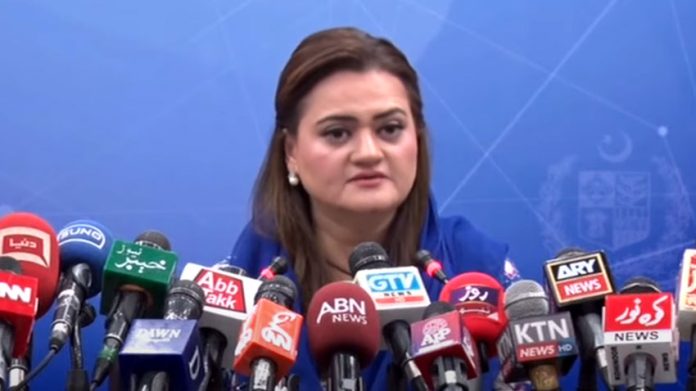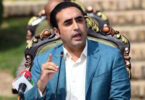F.P. Report
ISLAMABAD: Minister for Information and Broadcasting Marriyum Aurangzeb on Monday said the present government had saved the country from default by addressing the economic challenges deliberately created by the previous regime of Pakistan Tehreek-e-Insaf (PTI).
“Today, the project Imran has become a source of embarrassment for even those who had brought him to power as the masses are bearing the brunt of his 44-month-long economic destruction,” the minister said while addressing a news conference. “The PTI chief has crossed all limits in his enmity towards the country,” she said while lauding the leadership and the vision of Prime Minister Shehbaz Sharif who had not only saved the country from default, but also charted the country on the path of progress.
At the outset of press conference, she said the incumbent coalition government took many important steps in 14 months to undo the devastation caused by the four-year misrule of the inefficient and incompetent rulers. The PTI chief’s 44-month reign was a period of economic destruction, inflation, theft, loot and plunder, she added. His government signed the agreement with the International Monetary Fund (IMF) on tough conditions, first violated it and then suspended, pushing the country to the brink of default.
The PTI chairman had , in fact, crossed all limits to harm national interests as he and his cronies wanted the country to default like Sri Lanka, she added. The petrol price was, she said, reduced by the PTI chief in 2022 in violation of the IMF programme and it was done intentionally to get petty political mileage.
The minister recalled that when the present government came to power as a result of the first ever successful no-confidence motion in country’s history against the former prime minister, the economy was completely in ruins with jobless youth and unprecedented inflation. There was acute shortage of energy and there was hardly any fund to purchase petroleum products and liquefied natural gas (LNG), she added.
“When we came to power, the country was close to default, on the contrary when they (PTI) were brought in the government in 2018, it was developing at a growth rate of over 6.2 per cent.” The minister said when the Pakistan Muslim League-Nawaz (PML-N) government ended its tenure in 2018 with surplus electricity, but, ironically, the PTI leaders used to mock the party for producing surplus energy.
Marriyum said the PTI rulers destroyed every sector, including the foreign policy during their 44 months tenure and incumbent government faced great difficulties. Comparing first 14 months of the PTI regime with the same period of the present coalition government, she said sugar was not only expensive but also out of stock, and similarly flour and electricity were also not available in the market despite not being expensive.
Elderly women used to stand in long queues to buy a kilo of sugar during the PTI government, she recalled. The minister said during Covid-19, the price of LNG had fallen to as low as $3, but that historical opportunity to buy cheap LNG was missed. The country was left at the mercy of gas and flour mafia during the PTI regime. She said the current government not only saved the country from default in its14-month tenure, but also put the derailed economy back on track.
Marriyum said that for the first time, the IMF programme was successfully completed in 2016 during the tenure of Nawaz Sharif. She said the PTI regime destroyed the foreign policy and angered all the friendly countries, but the present government restored relations with the world in a confident manner.
“During 14 months we added 3,900 megawatt of electricity, but the PTI in its four years rule could not add even a single megawatt,” she added. The minister said the person who announced the construction of 350 dams in Khyber Pakhtunkhwa made the people “dam fool”. She said,”Saving the country from default, with economic stability, is the major achievement of the present government.”
Marriyum said the projects launched by Nawaz Sharif were delayed during the PTI government, that resulted into increase in their cost. Even maintenance of power production units was not carried out during the last regime, she added. Electricity generation from furnace oil had now become nil while the furnace oil mafia was ruling the roost during the PTI’s government, she said.
The minister said the previous government had put its political opponents in death cells under the false slogan of accountability, but failed to produce even a single evidence of their “crimes” in courts. Today, inexpensive oil was being imported from Russia, an affordable gas agreement had been signed with Azerbaijan but the PTI did politics on that issue as well, she remarked.
She said the PTI chief and its leadership falsely claimed to have discussed oil import with the Russian leadership as no such thing was mentioned in the communique or the press release issued at the end of his Moscow visit. They made the LNG contracts with foreign governments controversial and sent Miftah Ismail and Khaqan Abbasi to jail on the allegations of corruption just to mislead the people and inflict damage upon the country, she added.
The minister said the government had introduced distinct electricity tariffs for the wealthy and the underprivileged, aiming to shield the masses from inflationary pressures. The present government had not only averted a potential $10 billion penalty in the Reko Dek case but also successfully restored the agreement, the minister noted. She recalled that when the country was struck by devastating floods, Prime Minister Shehbaz Sharif allocated a substantial amount of Rs 100 billion to the provinces.
At that time, the ruling coalition held power only in the federation and Sindh, while the remaining provinces were governed by the PTI. Marriyum further criticized the PTI chief, pointing out instances where he abandoned meetings on the Coronavirus pandemic due to the presence of the Sindh Chief Minister and the then opposition leader, Shehbaz Sharif.
His decision, she asserted, demonstrated that how he prioritized arrogance and ego over national interests. During the flood calamity, she said one-third of the country was submerged, leading to extensive damage to crops and the loss of 1.1 million livestock. The disaster left approximately 8 million people homeless along with the loss of over 1,600 precious lives, she added. The damage, she said, would have been unimaginable if the calamity was not responded in time by the NDMA and PDMAs.
She said PM Shehbaz Sharif himself monitored the situation continuously and ensured that relief, rescue and reconstruction efforts were carried out in an effective way. He himself undertook visits across the country to review the ongoing efforts for the flood victims. A staggering sum of Rs 70 billion was directly distributed to the affected individuals through the Benazir Income Support Programme (BISP), providing crucial financial assistance during the challenging period, she added.
The minister said 100 houses were constructed in Tank to provide shelter for flood-affected individuals, and damaged schools were successfully reconstructed. Reconstruction efforts were still underway in many areas. She said PM Shehbaz Sharif raised his voice at international forums, including the United Nations, advocating for climate finance funds to address the urgent needs of countries affected by climate change.
At the Geneva conference, she said, he secured an assurance of $10 billion in funds, emphasizing the crucial role played by the Foreign Minister and the Climate Change Minister, who tirelessly worked day and night on the matter. The Ministry of Information also worked diligently to raise awareness among the people of Pakistan and the global community about the prevailing situation on flood, she added.
Despite the challenges, she said, the government did not succumb to despair or chaos. Instead, the prime minister showed unwavering dedication to the well-being of the people, particularly farmers. The introduction of the Rs 200 billion Kissan Package, which included initiatives such as youth business loans, subsidies on fertilizers, electricity, and tubewells, proved instrumental in supporting farmers.
Marriyum said the prime minister turned the flood crisis into an opportunity and took initiatives that led to a bumper crop due to his hard work, visionary approach, strong determination, and foresight regarding potential damages. To bridge the development gap between urban and rural areas, a Rs 20 billion rural development package was announced for Islamabad, she said, adding the package included projects related to road infrastructure, parks, mass transit, and schools.
She questioned as to why such a package had not been introduced during the past four years of PTI government. The minister also stated that the prime minister resumed the metro project in Islamabad soon after coming into the power. The metro project which led to the airport, was halted during the previous government tenure.
Today, the metro project operated on all routes within Islamabad, with Orange, Blue, and Green buses catering to the transportation needs of various segments of society, including labourers, teachers, students, professionals, and government employees, the minister noted. She said Prime Minister Shehbaz Sharif successfully completed projects such as Margalla Avenue, 7th Avenue, and Colonel Sher Khan Avenue, which significantly improved the city’s road infrastructure.
PM Shehbaz Sharif was scheduled to inaugurate Bara Kahu flyover project on July 30 that aimed to alleviate traffic congestion on one of the busiest routes in the area, she added. The minister said the timely completion of the project in just 14 months raised questions as to why similar initiatives were not accomplished during the four years of the previous government’s tenure.
In a bid to enhance recreational spaces and promote healthy activities, she said, a plan was underway to establish 35 new parks across the city. Additionally, an Olympic Village was worked out to foster sports and fitness-related endeavours. The minister said the Benazir Income Support Programme’s (BISP) allocations, which were Rs 235 billion in 2022, had been increased to Rs 404 billion in the 2023 budget and further soared to Rs 464 billion recently.
The BISP stipend witnessed an increase of 25 percent similarly, she added. The programme’s name was changed to Ehsaas by the PTI regime, which was nothing more than a political maneuver, she added. During the times of difficulty, such as the recent floods, she said, the government allocated a substantial amount of Rs 70 billion to provide relief to the BISP beneficiaries and those affected by the calamity. Emergency funds amounting to Rs 25,000 per family were distributed through a scientific and transparent process, ensuring that aid reached those who needed it the most, she added.
Additional measures had been implemented to alleviate financial burdens on the public, she said while recalling petrol subsidies, the Ramazan package, and the distribution of Rs 70 billion worth of free wheat flour throughout the country during 14 months of the government, she said. Recalling difficult negotiations with the IMF for restoration of bailout package, she said the prime minister and the finance minister held multiple meetings with its representatives to restore Pakistan’s credibility. As a result of those talks, Pakistan signed the standby agreement with the IMF which ushered into economic stability and 2446 points increase in the KSE 100 index, she added.







